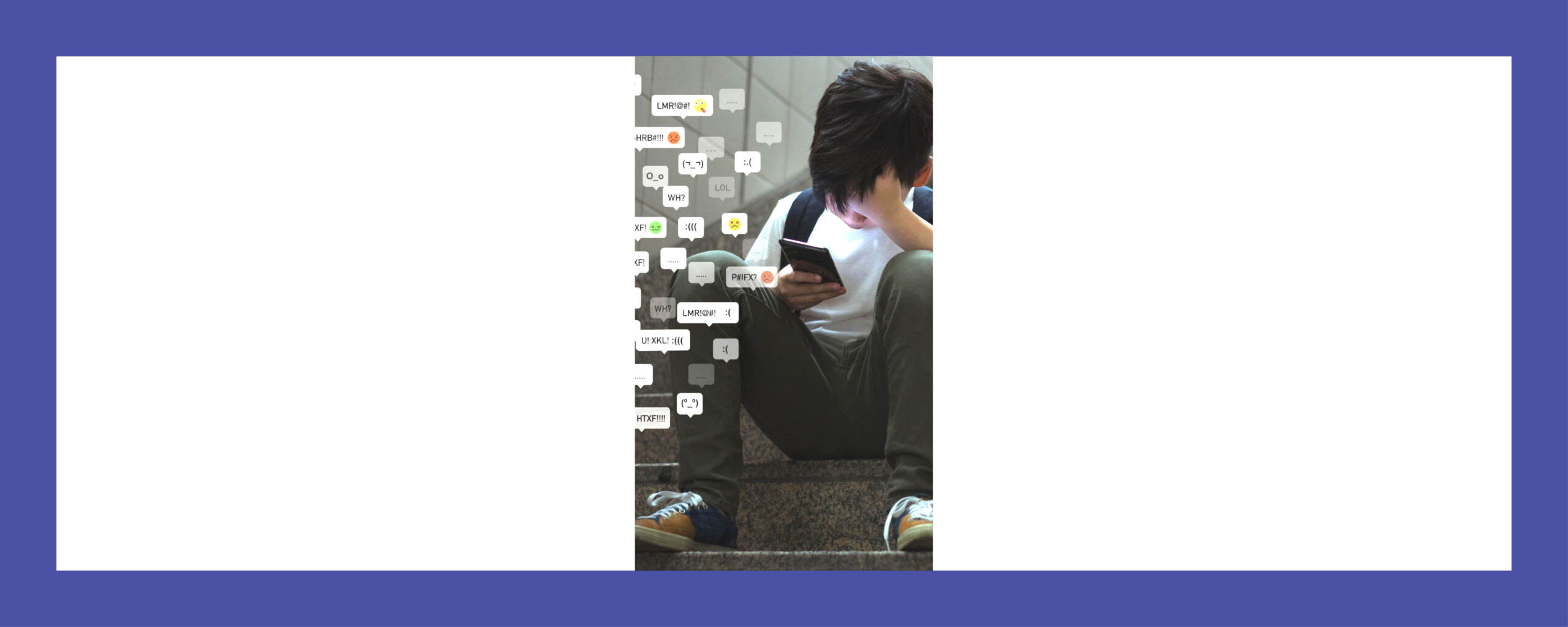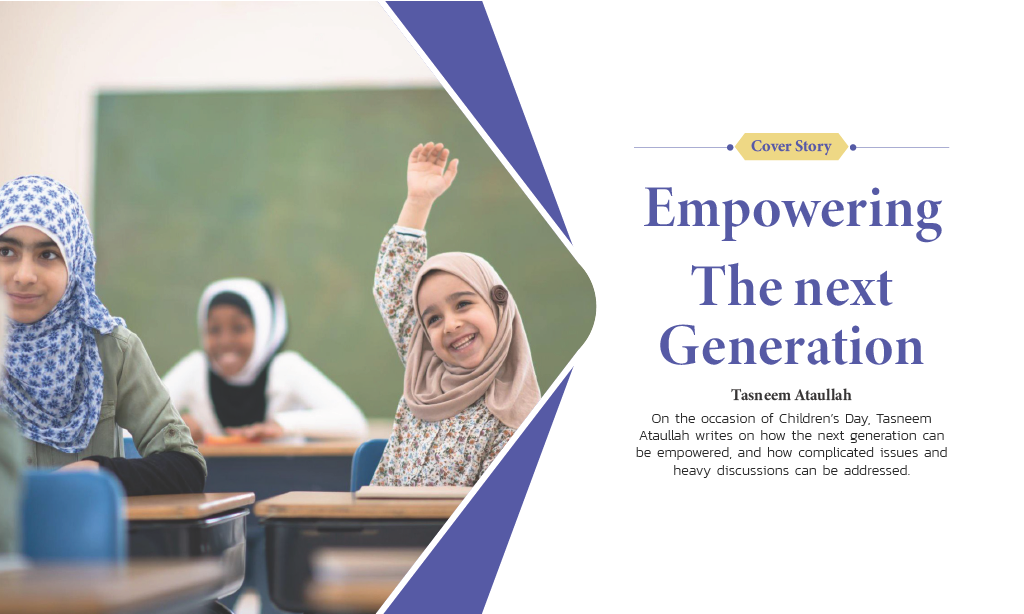“On the occasion of Children’s Day, Tasneem Ataullah writes on how the next generation can be empowered, and how complicated issues and heavy discussions can be addressed.”

Amidst the giggly chatters, cranky complaints, the need to be constantly available to just hear their imaginary stories, mental pressure of ‘what’s next’, to awaiting the ‘golden hour,’ which provides a momentary break to rush through the tasks list or to just breathe – a parent can never take this chaos for granted, especially in the context of the ongoing unrest. Children are the joys of life as well as a source of pride and strength. Their existence brings purpose into parents’ lives – a fruitful drive which they never felt before; to provide them with what they consider the best, to nurture them right, to shield them from every possible evil and teach them the reality of life and its survival; hence, the journey has its share of challenges and responsibilities which often makes parenthood rich and rewarding for many individuals.
The backbone of parenthood has been the same since the start of humanity, but over the years the process has evolved. It’s not uncommon for today’s parents to often hear the elderly chant their mantra of parenting from their times but with all due respect, it’s a generation gap! Ironically, less than 100 years ago, many children were sent to work rather than school – as a saying goes, “Don’t raise your children the way your parents raised you. They were born for a different time.”
With time, circumstances change, hence, the approach needs to evolve to reach the needed goal; to produce successful adults, who will navigate themselves and the society at large, towards an effective way of life. Parenting doesn’t come with a set of instructions, it’s instinctive and has to be!
One such arena that a parent can focus on today is the ongoing unrest between Palestine and Israel. The elders are well-informed from various sources; thanks to the media boom, there is an information overload to anything and everything. The positive side to this bombardment is, one can utilize their intellect and truthful instinct within to judge and justify the actions. The conflict which has deep historical roots, with disputes over issues such as territory, security to even basic necessities of survival like water, medicine and food, is currently the surface of every discussion on every channel possible, be it virtual or real.
However, such topics are usually not the basis for deep conversation between parents and their young children- there could be many reasons one could use to justify this; like sheltering young minds from violence, unrest and sensitive issues or in the quest to provide a carefree childhood, validating their tender age and soft feelings from reflections of terror, sadness and hatred or preventing them from taking sides or instilling the idea of violence and revenge against any one party.
But is keeping things away from children with the idea of protecting them the right attitude? Do they not have access to information on global issues from friends, peers, television, or even from just overhearing? Information is at your fingertips with the least bit of censorship. It’s very difficult to draw a line. Half knowledge is a very dangerous path as misleading information often creates a very vicious cycle intentionally or creepily innocently.
Therefore parents, the very first teachers, now have an additional responsibility to educate and inform their children on ethical standards. The way children are informed today will have a far-reaching impact on the future world we wish to see. It is integral for them to understand the prevailing issues so that they are able to make decisions maturely and responsibly as adults, later on. The idea is to open a communication bridge, where information, understanding and point of view are exchanged, validated and corrected – all for a better tomorrow. A calming space where the child can receive accurate information and a chance to express their fearful or upsetting emotions to the right people. This, indeed, is not an easy job.
Prophet Muhammed (PBUH) taught that each one of us is a shepherd and shall be asked about the responsibility given. With regards to children – to what extent effort was exerted to fulfil their rights, to grow them as responsible and educated members of society – morally, spiritually and ethically. It is the parent who lays down the initial foundation for the child’s personality.
Firstly, parents must educate themselves. Prior to communicating with their children, they must have accurate information without any bias. This will help in introducing children to diverse viewpoints and narratives about the situation and will encourage critical thinking and a well-rounded understanding.
Through self-education, one will be able to offer simple, clear and appropriate knowledge to the child in a way that will also address any misconception. The information needs to be tailored according to the child’s age and maturity level. Choose books, documentaries or narratives with accurate and balanced information about the history and culture of the present situation.
Younger children may need a simplified and less detailed explanation with more examples or storytelling. Explaining through parables is a successful method of educating children.
In fact, talking about world affairs can only be effective and appropriate if the information is adjusted to the child’s development stage. A 10-year-old shares all the same issues that are apparent in the real-world situation; trespassing into his personal space or belongings, injustice, lack of power to be able to change circumstances, and sudden cut-off of power or water. They don’t exactly need to know about the human rights charter, but a comparison can help them inculcate a lot.
By bringing issues to practical situations, we are not just filling them with facts and figures but also opening ways to practical solutions within the child’s own world. And this calls for communication – education is a two-way process and so is this.
Create an open and safe space for children to ask questions and be prepared to provide answers or explore the answers together. Allow them to find words to validate their feelings and most importantly, patiently hear them out. Acknowledge that it is normal to feel conflicting and intense emotions while also teaching them to channel them in the most ethical way.
In the right terms, a parent must emphasize the importance of understanding and empathizing with people from different backgrounds and experiences. As a result, the innocents in the conflict areas are brutally affected.
Children need to discuss these issues and ponder upon ways they could help and bring about a change. This can mean contacting organizations to donate or to discuss the ways they can help. An ethical way out is the only way to break the cycle of violence – one needs to develop the child’s thought process in this direction. Let these events widen their capacity, thought process and resilience. Let them realize that age is just a number and people are the power. By allowing the child to be proactive, we are empowering the child to move forward while simultaneously creating a ripple of positive change.
“Children are like buds in a garden and should be carefully and lovingly nurtured, as they are the future of the nation and the citizens of tomorrow” – Jawaharlal Nehru.


Nice article to understand child psychology and parenteral approach.